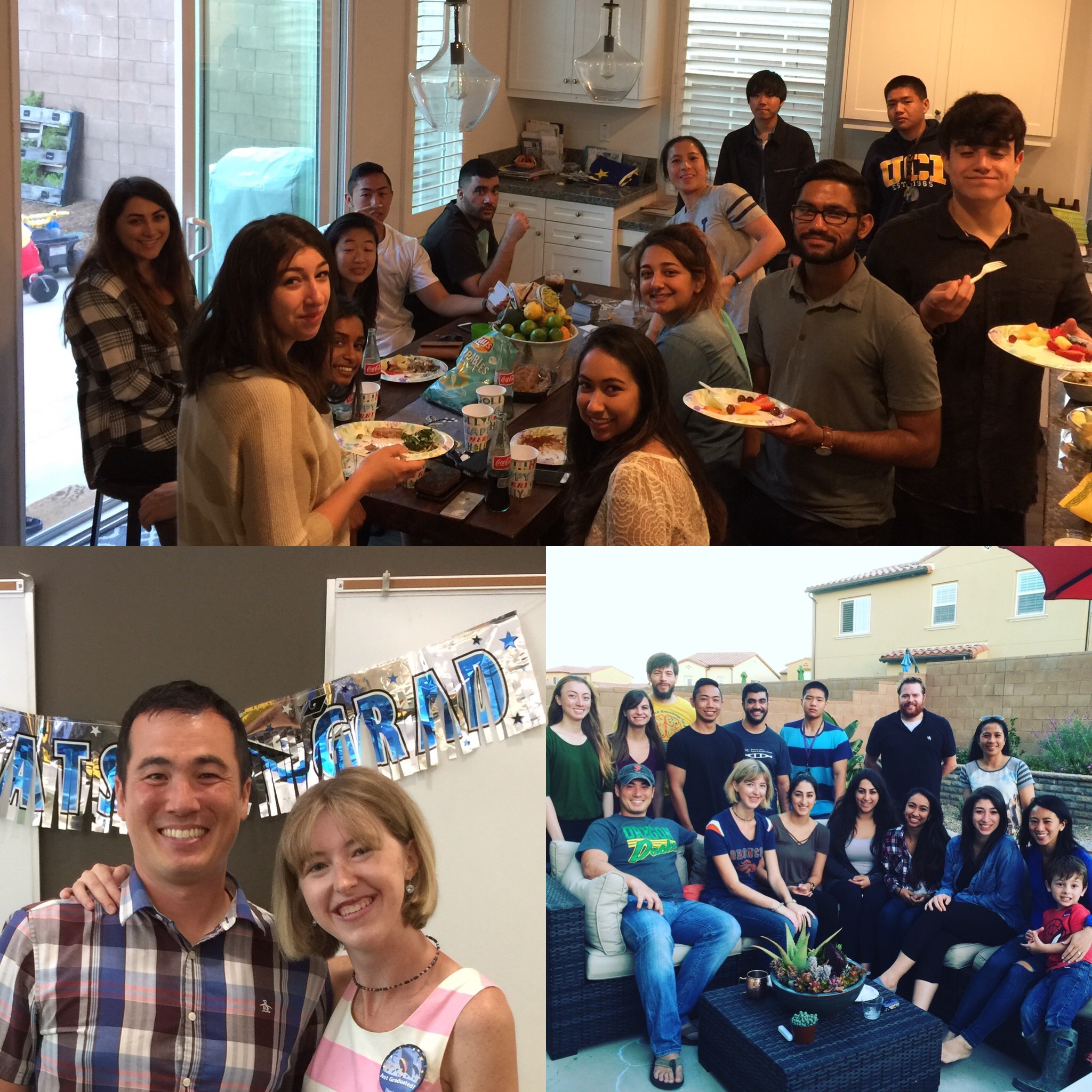News
-
11 2017
JCI Insight published our collaborative work describing aPKC-HDAC inhibitors as a therapeutic treatment in basal cell carcinoma spearheaded by the Oro labScott Atwood
 Advanced basal cell carcinomas (BCCs) circumvent Smoothened (SMO) inhibition by activating
GLI transcription factors to sustain the high levels of Hedgehog (HH) signaling required for their survival. Unfortunately, there is a lack of e cacious therapies. We performed a
gene expression– based drug repositioning screen in silico and identified the FDA-approved histone deacetylase (HDAC) inhibitor, vorinostat, as a top therapeutic candidate. We show
that vorinostat only inhibits proliferation of BCC cells in vitro and BCC allografts in vivo at high dose, limiting its usefulness as a monotherapy. We leveraged this in silico approach
to identify drug combinations that increase the therapeutic window of vorinostat and identified atypical PKC Ɩ/ʎ (aPKC) as a HDAC costimulator of HH signaling. We found that aPKC promotes
GLI1-HDAC1 association in vitro, linking two positive feedback loops. Combination targeting of HDAC1 and aPKC robustly inhibited GLI1, lowering drug doses needed in vitro, in vivo, and ex
vivo in patient-derived BCC explants. We identified a bioavailable and selective small-molecule aPKC inhibitor, bringing the pharmacological blockade of aPKC and HDAC1 into the realm of
clinical possibility. Our findings provide a compelling rationale and candidate drugs for combined targeting of HDAC1 and aPKC in HH-dependent cancers.
Read More PDF
Advanced basal cell carcinomas (BCCs) circumvent Smoothened (SMO) inhibition by activating
GLI transcription factors to sustain the high levels of Hedgehog (HH) signaling required for their survival. Unfortunately, there is a lack of e cacious therapies. We performed a
gene expression– based drug repositioning screen in silico and identified the FDA-approved histone deacetylase (HDAC) inhibitor, vorinostat, as a top therapeutic candidate. We show
that vorinostat only inhibits proliferation of BCC cells in vitro and BCC allografts in vivo at high dose, limiting its usefulness as a monotherapy. We leveraged this in silico approach
to identify drug combinations that increase the therapeutic window of vorinostat and identified atypical PKC Ɩ/ʎ (aPKC) as a HDAC costimulator of HH signaling. We found that aPKC promotes
GLI1-HDAC1 association in vitro, linking two positive feedback loops. Combination targeting of HDAC1 and aPKC robustly inhibited GLI1, lowering drug doses needed in vitro, in vivo, and ex
vivo in patient-derived BCC explants. We identified a bioavailable and selective small-molecule aPKC inhibitor, bringing the pharmacological blockade of aPKC and HDAC1 into the realm of
clinical possibility. Our findings provide a compelling rationale and candidate drugs for combined targeting of HDAC1 and aPKC in HH-dependent cancers.
Read More PDF
-
6 2017
Garima and Paige have graduated with their Master's degree! Congratulations! Scott Atwood

-
6 2016
Kevin has been awarded the SURP fellowship! Congratulations! Scott Atwood
Kevin Tan was awarded the Summer Undergraduate Research Program (SURP) fellowship at UC Irvine for the 2017 summer quarter. SURP provides funding for UCI undergraduates from all disciplines who are conducting summer research projects or creative activities under the guidance of UCI faculty members. The program offers students the opportunity to become immersed in a research topic for a full-time ten-week period, or the equivalent of 400 hours.
-
2 2017
Journal of the American Chemical Society published our collaborative communication on cell selective metabolic labeling of RNA spearheaded by the Spitale LabScott Atwood
 Stringent chemical methods to profile RNA gene expression with cell-type specificity is largely an unmet challenge in biology. We have developed
a method for chemoselective metabolic labeling of transcriptomes, in a cell-specific manner. To accomplish this goal we designed, synthesized, and tested a suite of caged nucleoside metabolic intermediates and have demonstrated
their ability to be metabolically incorpo-rated into RNA, with cell selectivity. Incorporation can be profiled and imaged using bioorthogonal chemistry. We anticipate our findings will provide the community with a much-needed
chemical toolset for profiling RNA expression, in a cell-type specific manner.
Read More PDF
Stringent chemical methods to profile RNA gene expression with cell-type specificity is largely an unmet challenge in biology. We have developed
a method for chemoselective metabolic labeling of transcriptomes, in a cell-specific manner. To accomplish this goal we designed, synthesized, and tested a suite of caged nucleoside metabolic intermediates and have demonstrated
their ability to be metabolically incorpo-rated into RNA, with cell selectivity. Incorporation can be profiled and imaged using bioorthogonal chemistry. We anticipate our findings will provide the community with a much-needed
chemical toolset for profiling RNA expression, in a cell-type specific manner.
Read More PDF
-
1 2017
Journal of Investigative Dermatology published our commentary on single molecule FISH in hair follicle development Scott Atwood
 Patched (Ptch) receptors are critical negative regulators of Hedgehog signaling, where Ptch1 loss causes basal cell carcinoma and Ptch1;Ptch2
loss disrupts skin and hair follicle development. Adolphe et al. use single molecule fluorescent in situ hybridization to
show quantitatively that Ptch receptors create a Hedgehog signaling gradient that may specify hair follicle development.
Read More PDF
Patched (Ptch) receptors are critical negative regulators of Hedgehog signaling, where Ptch1 loss causes basal cell carcinoma and Ptch1;Ptch2
loss disrupts skin and hair follicle development. Adolphe et al. use single molecule fluorescent in situ hybridization to
show quantitatively that Ptch receptors create a Hedgehog signaling gradient that may specify hair follicle development.
Read More PDF
-
1 2017
PLOS ONE published our collaborative work describing SUFU mutations in basal cell carcinoma spearheaded by the Oro labScott Atwood
 The Hedgehog pathway is a potent regulator of cellular growth and plays a central role in the development of many cancers including basal cell
carcinoma (BCC). The majority of BCCs arise from mutations in the Patched receptor resulting in constitutive activation of the Hedgehog pathway. Secondary driver mutations promote BCC oncogenesis and occur frequently due to
the high mutational burden resulting from sun exposure of the skin. Here, we uncover novel secondary mutations in Suppressor of Fused (SUFU), the major negative regulator of the Hedgehog pathway. SUFU normally binds to a
Hedgehog transcriptional activator, GLI1, in order to prevent it from initiating transcription of Hedgehog target genes. We sequenced tumor-normal pairs from patients with early sporadic BCCs. This resulted in the discovery
of nine mutations in SUFU, which were functionally investigated to determine whether they help drive BCC formation. Our results show that four of the SUFU mutations inappropriately activate the Hedgehog pathway, suggesting
they may act as driver mutations for BCC development. Indeed, all four of the loss of function SUFU variants were found to disrupt its binding to GLI, leading to constitutive pathway activation. Our results from functional
characterization of these mutations shed light on SUFU’s role in Hedgehog signaling, tumor progression, and highlight a way in which BCCs can arise.
Read More PDF
The Hedgehog pathway is a potent regulator of cellular growth and plays a central role in the development of many cancers including basal cell
carcinoma (BCC). The majority of BCCs arise from mutations in the Patched receptor resulting in constitutive activation of the Hedgehog pathway. Secondary driver mutations promote BCC oncogenesis and occur frequently due to
the high mutational burden resulting from sun exposure of the skin. Here, we uncover novel secondary mutations in Suppressor of Fused (SUFU), the major negative regulator of the Hedgehog pathway. SUFU normally binds to a
Hedgehog transcriptional activator, GLI1, in order to prevent it from initiating transcription of Hedgehog target genes. We sequenced tumor-normal pairs from patients with early sporadic BCCs. This resulted in the discovery
of nine mutations in SUFU, which were functionally investigated to determine whether they help drive BCC formation. Our results show that four of the SUFU mutations inappropriately activate the Hedgehog pathway, suggesting
they may act as driver mutations for BCC development. Indeed, all four of the loss of function SUFU variants were found to disrupt its binding to GLI, leading to constitutive pathway activation. Our results from functional
characterization of these mutations shed light on SUFU’s role in Hedgehog signaling, tumor progression, and highlight a way in which BCCs can arise.
Read More PDF
-
1 2017
Garima Naswa has joined the lab! Scott Atwood
 Garima, an excellent master's student from the Biotechnology Management program, has decided to pursue her master's work in the lab. Garima
received her B.S. in Technology and Biotechnology from Jaypee Institute of Information Technology in Noida, India where she studied bioethics, clinical trials, and database management. Garima is excited to expand her
studies by investigating transcription factor control in basal cell carcinoma. Welcome to the lab!
Garima, an excellent master's student from the Biotechnology Management program, has decided to pursue her master's work in the lab. Garima
received her B.S. in Technology and Biotechnology from Jaypee Institute of Information Technology in Noida, India where she studied bioethics, clinical trials, and database management. Garima is excited to expand her
studies by investigating transcription factor control in basal cell carcinoma. Welcome to the lab!
-
1 2017
Ledia, Nikita, Tanin, and Vama have been awarded the UROP fellowship! Congratulations! Scott Atwood
Four talented undergraduates were awarded the Undergraduate Research Opportunities Program (UROP) fellowship at UC Irvine for the 2016-2017 academic year. The mission of UROP is to integrate undergraduate students into the research culture of the University by providing opportunities for faculty and students to work together on research and creative projects. UROP helps support both the research mission of the University and its educational programs while promoting an undergraduate research culture at UCI. The program fosters collaboration between students, faculty, corporate entities and government agencies to prepare the undergraduate researcher for the challenges of tomorrow. By providing professional environments conducive to research advancement and career skills development, UROP provides students with unique opportunities to develop a wide variety of skills that will be useful in any future career or educational plans. By engaging students in research and creative opportunities, the program hopes to inspire in them a life-long passion for discovery and inquiry-based learning.
- Previous Older posts